中考英语语法总复习(外研社版)史上最全
外研社九年级语法知识点

外研社九年级语法知识点语法是学习语言的重要组成部分,它规定了词语之间的关系和句子的结构。
对于九年级学生来说,掌握语法知识点是必不可少的。
本文将介绍外研社九年级语法知识点,帮助学生更好地理解和应用这些知识。
一、名词性从句名词性从句是指在句中充当名词成分的从句。
常见的名词性从句有主语从句、宾语从句、表语从句和同位语从句。
例如:1. 主语从句:What she said surprised me. (她说的话让我感到惊讶。
)2. 宾语从句:He asked if I could help him. (他问我是否可以帮助他。
)3. 表语从句:The problem is whether we should go or stay. (问题是我们是去还是留。
)4. 同位语从句:Her belief is that hard work pays off in the end. (她的信念是努力工作最终会有回报。
)二、动词的时态和语态动词的时态和语态反映了动作或状态发生的时间和动作的主体。
常见的时态有一般现在时、一般过去时、一般将来时等。
例如:1. 一般现在时:The sun rises in the east. (太阳从东方升起。
)2. 一般过去时:They played basketball yesterday. (他们昨天打篮球。
)3. 一般将来时:We will have a meeting tomorrow. (明天我们将开会。
)另外,英语中还有被动语态,用于表示动作的承受者或变化的主体。
例如:The window was broken by the strong wind. (窗户被强风掀破了。
)三、形容词和副词的比较级和最高级形容词和副词的比较级和最高级用于表示两者或多者之间的程度、大小或顺序。
常见的比较级有比较级、原级和最高级。
例如:1. 比较级:The weather today is hotter than yesterday. (今天的天气比昨天热。
九年级外研版语法知识点

九年级外研版语法知识点一、名词名词是指人、事物、地方、动物等的名称。
在句子中常用作主语、宾语、定语等成分。
1. 单数和复数形式名词的单数形式表示一个,而复数形式表示多个。
通常,名词的复数形式在词尾加-s或-es。
例:cat(猫)→cats(猫们), box(盒子)→boxes(盒子们)2. 不可数名词不可数名词是指表示不能分为单个单位的物质、抽象概念等名词。
不可数名词通常没有复数形式,也不能与冠词a/an连用,但可以与some/any等词搭配使用。
例:water(水), information(信息), happiness(幸福)3. 名词所有格名词所有格用来表示所属关系。
通常,在名词后面加-apostrophe(’)和-s来表示所有格。
例:Mary’s book(玛丽的书), the students’ desks(学生的桌子)二、代词代词是用来代替名词的词语,可以用来指代特定的人、物、地点等。
代词能使句子更加简洁明了。
1. 主格和宾格代词有主格和宾格两种形式。
主格代词可作主语、表语等,而宾格代词可作宾语、介词宾语等。
例:I(主格)like her(宾格).2. 反身代词反身代词用于表示动作的反身或强调。
反身代词通常与动词或介词短语中的名词或代词一起使用。
例:He hurt himself(他伤到了自己), She talked to herself in the mirror(她对着镜子自言自语).三、动词动词是表示一个人、物或事物的动作、状态或存在的词。
动词是句子中最重要的成分之一。
1. 时态动词的时态用来表示动作发生的时间。
常见的时态有一般现在时、一般过去时、一般将来时等。
例:I play basketball(我打篮球), He played football yesterday (他昨天踢足球), We will go to the park tomorrow(我们明天去公园).2. 动词的语态动词的语态用来表示动作发出者和接受者之间关系的不同。
外研版中考复习

语法专题Module 1简单句:由一个主语(或并列主语)和一个谓语(或并列谓语)构成。
一. 五种基本句型:1.主语+系动词+表语(S+V+P)He is happy.2.主语+不及物动词+(状语)( S+V ) He is swimming.3.主语+及物动词+宾语+(状语)( S+V+O ) I saw him just now.4.主语+及物动词+间接宾语+直接宾语( S+V+IO+DO ) She lent me a bike, 主语+及物动词+直接宾语+间接宾语( S+V+DO+IO ) She lent a bike to me.5.主语+及物动词+宾语+宾语补足语( S+V+O+OC) The good news made us happy.二. 练习:写出下列句子的基本成分。
1.He likes music very much.2.The soup tastes salty.3.She works very hard.4.My teacher asked me to come a little earlier next time.5.My father bought me a computer.Module 2宾语从句:以一个句子作为宾语的复合句。
一.He said that he couldn’t finish the work on time.The teacher told us that the earth goes around the sun.二. 宾语从句的语序:陈述句的语序。
三.Is he American? He asked ---- He asked if / whether he was American.Where is the cinema? I don’t k now ---- I don’t know where the cinema is.四. 练习:把下列句子改为宾语从句。
外研版九年级上册英语语法总结
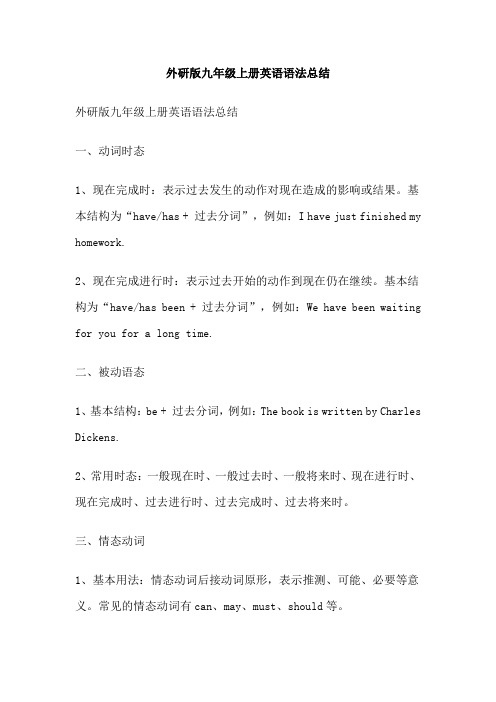
外研版九年级上册英语语法总结外研版九年级上册英语语法总结一、动词时态1、现在完成时:表示过去发生的动作对现在造成的影响或结果。
基本结构为“have/has + 过去分词”,例如:I have just finished my homework.2、现在完成进行时:表示过去开始的动作到现在仍在继续。
基本结构为“have/has been + 过去分词”,例如:We have been waiting for you for a long time.二、被动语态1、基本结构:be + 过去分词,例如:The book is written by Charles Dickens.2、常用时态:一般现在时、一般过去时、一般将来时、现在进行时、现在完成时、过去进行时、过去完成时、过去将来时。
三、情态动词1、基本用法:情态动词后接动词原形,表示推测、可能、必要等意义。
常见的情态动词有can、may、must、should等。
2、特殊用法:情态动词后接“have + 过去分词”,表示推测、可能、必要等意义。
例如:You must have misunderstood me.四、定语从句1、基本用法:在句子中,定语从句用来修饰主语、宾语或表语。
引导定语从句的有that、which、who等。
2、难点解析:如何判断定语从句的引导词,根据定语从句与先行词的关系以及定语从句在句子中的作用来决定。
五、状语从句1、时间状语从句:用来表达动作发生的时间,例如:When the sun sets,we will go home.2、条件状语从句:用来表达某个条件下的结果,例如:If it rains tomorrow,we will stay at home.3、原因状语从句:用来表达原因或理由,例如:Because he was late,he missed the train.六、名词性从句1、主语从句:在句子中作主语,例如:What they need is more time.2、宾语从句:在句子中作宾语,例如:He told me that he would comeback soon.3、表语从句:在句子中作表语,例如:The reason why he left is unclear.以上是外研版九年级上册英语语法的主要内容,同学们在学习过程中要注意理解语法规则的基本含义和用法,多加练习,提高自己的英语语言能力。
外研版初三上学期英语语法总结及复习要点

外研版初三上学期英语语法总结及复习要点一、时态1一般现在时定义:表示经常、习惯或一般性的动作或状态,或表示客观事实。
结构:主语+ 动词原形/第三人称单数形式(+ 其他)。
例子:She always gets up early.(她总是起得很早。
)The sun rises in the east.(太阳从东方升起。
)2一般过去时定义:表示过去某个时间发生的动作或状态。
结构:主语+ 动词过去式(+ 其他)。
例子:She went to the park yesterday.(她昨天去了公园。
)I didn't know him before.(我以前不认识他。
)3一般将来时定义:表示将来某个时间将要发生的动作或状态。
结构:主语+ will/shall + 动词原形(+ 其他)。
例子:I will go to the cinema this evening.(我今晚将去看电影。
)They won't be late again.(他们不会再迟到了。
)4现在进行时定义:表示现在正在发生的动作或正在进行的状态。
结构:主语+ be动词(am/is/are)+ 现在分词(+ 其他)。
例子:She is studying hard.(她正在努力学习。
)They are playing football on the playground.(他们正在操场上踢足球。
)5过去进行时定义:表示过去某个时间正在发生的动作或状态。
结构:主语+ was/were + 现在分词(+ 其他)。
例子:When I called him, he was working in his office.(当我给他打电话时,他正在办公室工作。
)6将来进行时定义:表示将来某个时间正在发生的动作或状态。
结构:主语+ will be + 现在分词(+ 其他)。
例子:This time next week, they will be staying in a hotel in Paris.(下周这个时候,他们将住在巴黎的一家旅馆里。
外研版九年级英语语法整理
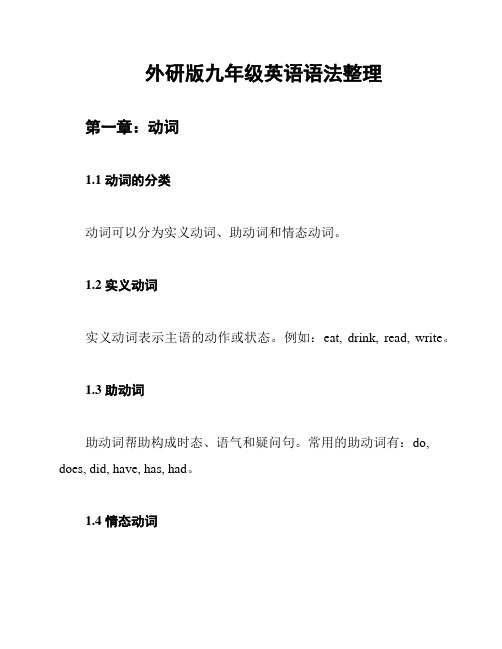
外研版九年级英语语法整理第一章:动词1.1 动词的分类动词可以分为实义动词、助动词和情态动词。
1.2 实义动词实义动词表示主语的动作或状态。
例如:eat, drink, read, write。
1.3 助动词助动词帮助构成时态、语气和疑问句。
常用的助动词有:do, does, did, have, has, had。
1.4 情态动词情态动词表示可能性、能力、建议、命令等。
常用的情态动词有:can, may, must, shall, will。
1.5 动词的时态动词的时态表示动作发生的时间。
常用的时态有:现在时、过去时、将来时。
1.6 动词的语态动词的语态表示主语与动作的关系。
常用的语态有:主动语态、被动语态。
第二章:名词2.1 名词的分类名词可以分为可数名词和不可数名词。
2.2 可数名词可数名词表示可以数的事物。
例如:boy, girl, book, pen。
2.3 不可数名词不可数名词表示不能数的事物。
例如:water, air, rice。
2.4 名词的所有格名词的所有格表示名词所表示的人或事物所属的关系。
例如:my book, the boy's pen。
第三章:形容词和副词3.1 形容词形容词用来修饰名词,表示名词的性质、状态等。
例如:big, tall, happy。
3.2 副词副词用来修饰动词、形容词或其他副词,表示程度、时间、地点等。
例如:quickly, happily, always。
3.3 形容词和副词的比较级和最高级形容词和副词的比较级和最高级表示程度的大小。
第四章:代词4.1 代词的分类代词可以分为人称代词、物主代词、反身代词、指示代词、疑问代词和关系代词。
4.2 人称代词人称代词表示人的称呼。
例如:I, you, he, she, it, we, they。
4.3 物主代词物主代词表示所有关系。
例如:my, your, his, her, its, our, their。
外研九年级语法知识点汇总
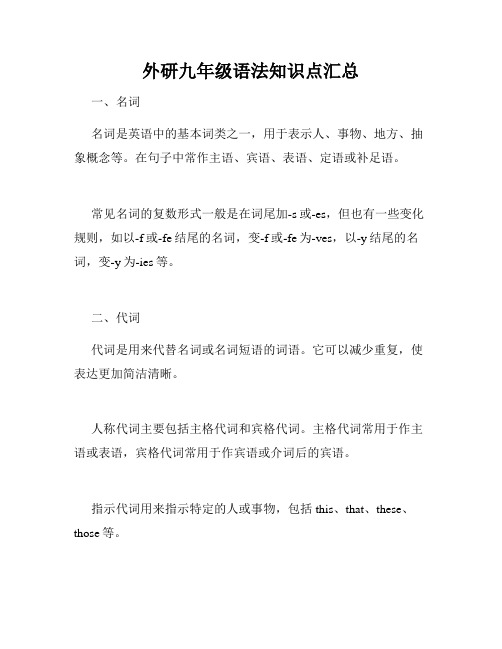
外研九年级语法知识点汇总一、名词名词是英语中的基本词类之一,用于表示人、事物、地方、抽象概念等。
在句子中常作主语、宾语、表语、定语或补足语。
常见名词的复数形式一般是在词尾加-s或-es,但也有一些变化规则,如以-f或-fe结尾的名词,变-f或-fe为-ves,以-y结尾的名词,变-y为-ies等。
二、代词代词是用来代替名词或名词短语的词语。
它可以减少重复,使表达更加简洁清晰。
人称代词主要包括主格代词和宾格代词。
主格代词常用于作主语或表语,宾格代词常用于作宾语或介词后的宾语。
指示代词用来指示特定的人或事物,包括this、that、these、those等。
三、形容词形容词用来修饰名词或代词,表示人或物的性质、特征、状态等。
它可以放在名词前或后,也可以作表语。
比较级和最高级是形容词的两种特殊形式,用来表示比较级别。
四、副词副词用来修饰动词、形容词、其他副词或整个句子,表示时间、地点、方式、程度等。
常见副词有well、quickly、easily、sometimes、never等。
五、动词动词是表示一个动作或状态的词语,在句子中常作谓语,也可以用来表示存在、变化、情感等。
动词的时态主要包括一般现在时、一般过去时、一般将来时等。
不同时态的动词形式有所不同。
动词的语态有主动语态和被动语态。
在被动语态中,动作的承受者或对象成为句子的主语。
六、时态和语态时态表示动作或状态发生的时间,包括一般现在时、一般过去时、一般将来时、现在进行时、过去进行时等。
语态表示动作的主动或被动关系,包括主动语态和被动语态。
被动语态的构成是由“be+动词的过去分词”。
七、连接词连接词用来连接句子或句子成分,使其之间关系更加紧密。
常见的连接词有and、but、or、because、although等。
连接词可以分为并列连接词、转折连接词、选择连接词、原因连接词、条件连接词等。
八、介词和介词短语介词是用来表示时间、地点、方式、原因等关系的词语。
外研版九上英语总复习含语法知识点共214页

│ 重点突破
·外研版
│ 重点突破
·外研版
│ 重点突破
·外研版
│ 重点突破
·外研版
│ 重点突破
·外研版
│ 重点突破
·外研版
│ 重点突破
·外研版
│ 重点突破
·外研版
│ 重点突破
·外研版
│ 重点突破
·外研版
│ 重点突破
·外研版
│ 重点突破
·外研版
│ 重点突破
·外研版
│ 重点突破
类别
课标考点要求
重点 短语
·外研版
│ 基础过关
类别
课标考点要求
重点 短语
·外研版
│ 基础过关
类别
课标考点要求
重点 句型
·外研版
│ 基础过关
类别
课标考点要求
重点 句型
·外研版
│ 基础过关
类别
课标考点要求
重点 句型
·外研版
│ 基础过关
类别
课标考点要求
重点 句型
·外研版
│ 基础过关
类别
课标考点要求
│ 基础过关
类别
重点 单词
课标考点要求
·外研版
│ 基础过关
类别
重点 单词
课标考点要求
·外研版
│ 基础过关
类别
课标考点要求
词汇 拓展
·外研版
│ 基础过关
类别
课标考点要求
词汇 拓展
·外研版
│ 基础过关
类别
课标考点要求
重点 短语
·外研版
│ 基础过关
类别
课标考点要求
重点 短语
·外研版
│ 基础过关
(完整word版)中考英语语法总复习(外研社版)史上最全
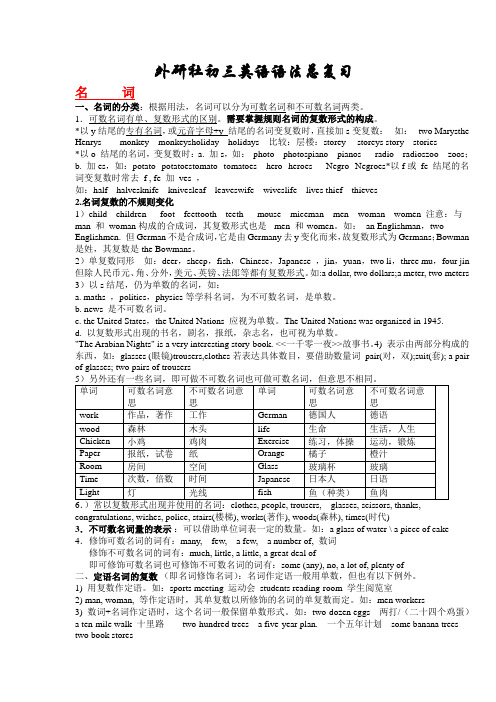
外研社初三英语语法总复习名词一、名词的分类:根据用法,名词可以分为可数名词和不可数名词两类。
1.可数名词有单、复数形式的区别。
需要掌握规则名词的复数形式的构成。
*以y结尾的专有名词,或元音字母+y 结尾的名词变复数时,直接加s变复数:如:two Marysthe Henrys monkey---monkeysholiday---holidays比较:层楼:storey ---storeys story---stories*以o 结尾的名词,变复数时:a. 加s,如:photo---photospiano---pianos radio---radioszoo---zoos;b. 加es,如:potato--potatoestomato--tomatoes hero--heroes Negro--Negroes*以f或fe 结尾的名词变复数时常去f , fe 加ves ,如:half---halvesknife---knivesleaf---leaveswife---wiveslife---lives thief---thieves2.名词复数的不规则变化1)child---children foot---feettooth---teeth mouse---miceman---men woman---women 注意:与man 和woman构成的合成词,其复数形式也是-men 和-women。
如:an Englishman,two Englishmen. 但German不是合成词,它是由Germany去y变化而来,故复数形式为Germans;Bowman 是姓,其复数是the Bowmans。
2)单复数同形如:deer,sheep,fish,Chinese,Japanese ,jin,yuan,two li,three mu,four jin 但除人民币元、角、分外,美元、英镑、法郎等都有复数形式。
完整外研版初中英语语法总结

赞成某人1 agree with sb2 visit to…参观某个地方3 a piece of cake =easy 小菜一碟(容易)4 (see 、hear 、notice 、find 、feel 、listen to 、 look at (感官动词)+doeg:I like watching monkeys jump5 all kinds of 各种各样 a kind of 一样6 all over the world = the whole world 整个世界7 along with同……一道,伴随……eg : I will go along with you我将和你一起去the students planted trees along with their teachers 学生同老师们一起种树8 as soon as 一怎么样就怎么样9 as you can see 你是知道的10 ask for ……求助向…要…(直接接想要的东西) eg : ask you for my book11 ask sb for sth 向某人什么12 ask sb to do sth 询问某人某事ask sb not to do 叫某人不要做某事13 at the age of 在……岁时 eg:I am sixteen I am at the age of sixteen14 at the beginning of …………的起初;……的开始15 at the end of +地点/+时间最后;尽头;末尾 eg : At the end of the day16 at this time of year 在每年的这个时候17 be /feel confident of sth /that clause +从句感觉/对什么有信心,自信eg : I am / feel confident of my spoken EnglishI feel that I can pass the test18 be + doing 表:1 现在进行时 2 将来时19 be able to (+ v 原) = can (+ v 原)能够…… eg : She is able to sing She can sing20 be able to do sth 能够干什么 eg :she is able to sing21 be afraid to do (of sth 恐惧,害怕…… eg : I'm afraed to go out at night I'm afraid of dog22 be allowed to do 被允许做什么 eg: I'm allowed to watch TV 我被允许看电视 I should be allowed to watch TV 我应该被允许看电视 23 be angry with sb 生某人的气eg : Don't be angry with me为什么而生某人的气24 be angry with(at) sb for doing sth25 be as…原级…as 和什么一样她和我一样高eg : She is as tall as me表示越来越怎么样比较级) 26(比较级 and27 be away from 远离 28 be away from 从……离开 29 be bad for 对什么有害在太阳下看书对你的眼睛不好eg : Reading books in the sun is bad for your eyes出生于30 be born31 be busy doing sth 忙于做什么事 be busy with sth 忙于……当心;小心32 be careful33 be different from……和什么不一样以……著名34 be famous for135 be friendly to sb 对某人友好36 be from = come from 来自eg :He is from Bejing He comes from Bejing Is he from Bejing ? Does he come from Bejing ?37 be full of 装满……的 be filled with 充满eg: the glass is full of water the glass is filled with water38 be glad+to+do/从句39 be going to + v(原)将来时40 be good at(+doing) = do well in 在某方面善长, 善于……41 be good for 对什么有好处 eg : Reading aloud is good for your English42 be happy to do 很高兴做某事43 be helpful to sb 对某人有好处eg : Reading aloud is helpful to you 大声朗读对你有好处Exercising is helpful to your bady 锻炼对你的身体有好处44 be in good health 身体健康45 be in trouble 处于困难中eg : She is in trouble They are in tronble46 be interested in 对某方面感兴趣47 be late for = come late to 迟到eg: Be late for class 上课迟到48 be like 像…… eg : I'm like my mother49 be mad at 生某人的气50 be made from 由……制成(制成以后看不见原材料)51 be made of 由……制成(制成以后还看得见原材料)52 be not sure 表不确定53 be on a visit to 参观 54 be popular with sb 受某人欢迎55 be quiet 安静56 be short for 表**的缩写eg: 陶 is short for 陶俊杰57 be sick in bed 生病在床58 be sorry to do sth be sorry for sb eg : I am sorry for you59 be sorry to hear that60 be sorry to trouble sb eg : I am sorry to trouble you61 be strict in doing sth 严于做某事 eg : He's strict in obeying noles62 be strict with sb 对某人要求严格eg: Some students are not strict with them selves 这些学生对自己不严格63 be strict with sb in sth 某方面对某人严格64 be supposed to do 被要求干什么65 be sure 表确定66 be sure of doing sth 对做某事有信心eg: He is sure of winning I am sure of learning English well67 be sure of sth 对做某事有信心eg: I'm sure of my head (my teacher 我相信我的大脑(老师)68 be sure that sth 对做某事有信心eg: I'm suer that he can pass the test 我相信他能通过考试69 be sure to do sth一定会做某事eg: We are sure to pass the test 我们一定会通过这次考试2We are sure to learn English well 我们一定能学好英语70 be terrified of + 名/动doing 害怕……71 be terrified to do sth 害怕做某事72 be the same as …和什么一样73 be used to doing sth 习惯做某事eg: My father is used to getting up early 我爸爸习惯早He is used to sleeping in class 他习惯上课睡觉74 be worth doing 值得做什么75 be(feel) afraid to do sth 害怕做某事be afraid of sth 害怕某物be afraid that 丛句76 because+句子 because of +短语eg : He was late because he had a headache He was late because of his headache77 begin to do = start to do 开始做某事 start…with…=begin…with…以什么开始什么eg : Let's begin the game with the song I begin to go home78 between…and…两者之间79 borrow sth from sb 向……借…… lend sth to sb ( lend sb sth 借给……什么东西eg : I borrowed a pen from him he lent a pen to me ( he lent me a pen80 both = the same(as) = not different(from) 表相同81 bother 打扰 bother sb to do stheg : I'm sorry to bother you ,but can you tell me to way to the station我十分道歉打扰你,但是你能告诉我怎么去车站the problem has been bothering me for weeks 这个问题困扰了我几个周了He's bothering me to lend him money82 by the end of 到……为止83 call sb sth eg : We call him old wang84 care 关心 eg : Don't you care about this country's future ?你为什么不关心国家的未来带某人去某地地点赶上某人 86 chat with sb 和某人闲谈 take sb to + 85 catch up with sb进87 come in过来88 come over to提出89 come up with你能想出一个好办法吗?eg: Can you come up with a good idea和某人交流90 communicate with sb91 consider + doing 考虑做什么 eg : Why not consider going to lu zhou 为什么不考虑去泸州? 92 dance to 随着……跳舞eg : She likes dancing to the music 她喜欢随着音乐跳舞 93 decide to do sth 决定做某事做某方面的调查94 do a survey of 在……方面做得更好95 do better in做错96 do wrong 97 Don't forget to do sth 不要忘了做某事不要介意…… 98 Don't mind +doing /从句 /名词名(单)每一个…eg : Each student has many books 每一个学生都有一些书99 each +100 end up +doing101 enjoy +doing喜欢 102 escape from 从……逃跑 3eg: The prisoners have escaped from the prison犯人从监狱里逃跑出来103 expect to do sth 期待做某事104 fall down 摔下来 fall off 从哪摔下来105 fall in love with sb /sth 爱上什么106 far from 离某地远 eg : The school is far from my home107 find +it +adj +to do 发现做某事怎么样108 find sb/sth +adj 发现什么怎么样 eg : I find the book interesting109 finish 完成+doing(名词)110 fit to sb = be fit for sb 适合某人111 forget to do 没有做而忘了 forget doing 做了而又忘了 eg: Don't forget to go home I forget closing door 112 from…to…从某某到某某 eg: From me for her113 get /have sth down 做完,被(别人)做…eg: I have my hair cut 我理了发(头发被剪了)Tom got his bad tooth pulled out 汤母把他的坏牙拔掉了(被牙医拔掉了)114 get a part-time job= find a part-time job115 get along well with sb = get on well with sb 与某人相处得好116 get along with sb = get on with sb 与某人相处117 get ready for = be ready for为什么而准备eg : I get ready for math I am ready for math118 get sb in to trouble 给某人麻119 get sb to do sth120 get…from…从某处得到某物121 give a talk 做报告 eg: He is give a tall122 give sth to sb give sb sth 给某人某物123 go fish 钓鱼 go swimming 游泳124 go on to do 去做下一件事 go on doing 继续做这件事125 go out away from go out of126 go to school 上学(用于专业的)go to the school 去学校(不一定是上学)127 good way to 好方法128 hate to do 讨厌没做过的事 hate doing 讨厌做过的事129 have a party for sb 举办谁的晚会130 have a talk 听报告谈一谈131 have been doing 现在完成进行时eg : You have been talking You have been sleeping since132 have been to …( 地方)……去过某过地方have gone to …(地方)去了某地还没回来133 have fun +doing 玩得高兴134 have sth to do 有什么事要做eg: I have a lot of homework to do 我有很多家庭作业要做I have nothing to do 我没什么事情做135 have to do sth 必须做某事136 have trouble (problem) (in) doing sth 做什么事情有麻烦137 have…time +doing138 have…(时间)…off 放……假 eg: I have month off 我请一个月得假139 hear sb +do/doing 听见某人做某事/正在做某事140 help a lot 很大用处141 help sb with sth \one's sth 帮助某人某事(某方面) help sb (to) do sth 帮助某人做某事4142 hope to do sth 希望做某事143 How about(+doing) = What about(+doing)144 how do you like = what do you think of 你对什么的看法145 if : 是否=wethereg: I don't know if (wether) I should go to the party 我不知道我是否应该去参加晚会He don't know if (wether) we will arrive on time tomorrow morning 他不知道我们明天早上是否能准时到达146 if :如果,假如(全部接一般时态)+条件语态从句eg: I'll go to LuZhou if it does't rain 假如明天不下雨,我就去泸州If they change the plan they will let me know 假如他们要改变计划,他们会让我知道的I'll go to England ,if I have enough money next year 如果我明年由足够的钱,我就要去英国147 in one's opinion = sb think 某人认为148 in some ways 在某些方面149 in the end = finally(adv) 最后150 in the north of…什么在什么的北方(north 北 sowth 南 west 西 east 东)151 in the sun 在太阳下152 increase 增加eg : They've increased the prece of petrol by 3% 他们把石油价增加了3%the population has increased from 12 million ten years ago to 18 million now153 instead of +(名)代替eg: I'd like an apple instead of a pear 我想要苹果,而不要梨子I like English instead of math 我喜欢英语而不喜欢数学154 introduce sb to sb 介绍某人给某人 introduce oneself 自我介绍155 invite sb to do sth 邀请某人做某事156 It takes sb sometime to do sth 做某人花掉某人多少时间eg : It took me 5 minutes to do my homework It takes me half an hour to cook157 It's +adj +for sb to do sth 对某人来说做某事怎么样158 It's +adj +to do 做某事怎么样159 It's +adj for sb 对于某人来说怎么样 It's +adj of sb 对某人来说太怎么样160 It's +adj(for sb) to do(对某人来说)做某事怎么样It's +adj of sb to do sth 对某人来说做某事太怎么样eg: It's nice of you to help me with my English161 It's a good idea for sb to do sth 对……来说是个好主意162 It's important to sb 对某人来说很重要 eg: It's important to me163 It's time to do sth It's time for sth 到了该去做某事的时间eg : It's time to have class It's time for class 该去上课了164 join = take part in 参加165 just now 刚才166 keep +sb /sth +adj /介词短语让什么保持什么样?167 keep out 不让……进入168 keep sb adj 让……保持……eg: I want to keep my mother happy keep healthy 保持健康169 key to +名词表示:某物的钥匙或某题的答案170 key to… anser to … key 可以是答题或钥匙171 laugh at…取笑……eg : Don't langh at others We langhed at the joke172 learn by oneslfe 自学5173 learn from sb 向某人学习 eg: We should learn from Lei Feng174 learn to do sth 学做某事175 let sb do sth 让某人做某事176 Let sb down 让某人失望 eg : We shouldn't let our farents down 我们不应该让我们的父母失望177 live from :离某地远178 live in +大地方 /at +小地方居住在某地 eg: I live in LuZhou She lives at XuanTan179 look after = take care of 照顾照看180 lose one's way 谁迷路 eg : Lose your way 你迷路181 make a decision to do sth 决定做某事182 make friends with sb 和谁成为朋友 eg : I want to make friends with you183 make it early 把时间定的早一点184 make on exhibition of oneself 让某人出洋相185 make sb /n +n 使什么成为什么 eg : I made her my step moller I made you my wife186 make sb /sth +adj 使某人(某物)怎么样 eg : You must made your bed clean187 make sb /sth adj 使某人/某物怎么样188 make sb do sth 让某人做某事 eg : I made him write 我以前让他写189 make up be made up of (被动语态)由……组成190 make…difference to…191 mind sb to do mind one's doing 介意……做什么192 most +名 most of +代193 much too +形容词194 must be 一定195 need +名词196 need sb do sth 需要某人做某事197 need to do (实义动词) need do (情态动词)198 no /neithr of hate to do no /neithr of hate doing199 no +名词200 not anymore = no more 再也不…… eg: He didn't cry any more He cried no more 他再也不哭201 not… (形、副)at all eg: He's not tall at all she doesn't junp far at all202 not…at all 一点都不203 not…either 表否定,也不 eg : I don't japanse either I don't have sister, either 我也没有姐姐204 not…until 直到……才……eg: I didn't sleep until my mother came back The child didn't stop crying until I give her sugar205 offer / provide sb with sth 给某人提供206 offer sb sth ( offer sth to sb 提供什么东西给某人 eg : I offer you water (I offer water to you 我给你提供水207 on one's way to…在谁去那的路上另一方面208 on the one hand 一方面 on the other hand用电话交谈209 on the phone = over the phone及时准时 in time 210 on timesomeday 一天,有一天211 one day =some day =可数名词的复数形式212 one of + 一个到另一个213 one to anothereg : He cleaned the floor over and over agin 一遍又一遍的214 over and over agin全职工作 fall-time job 215 part-time job 兼职工作,付钱 pay the bill 216 pay for…付……钱开钱217 please +do 6218 please help yourself219 pleased with sb220 pool into = pore into221 practice +doing 练习做某事222 prefer sth to sth 相对……更喜欢…… eg : I prefer physics to chemisty 在物理和化学中,我更喜欢物理prefer doing to sth 更喜欢去做…不愿意去做… eg: He prefers riding a bike to diving 他更喜欢骑自行车,不开小车prefer to do sth rather than do sth 宁愿做…也不愿eg: My unde prefers to buy a now car rather than repaiv the used one 我叔叔更喜欢买新的车,也不去修旧车prefer sb not to do sth 更愿意… eg: I prefer her not to come 我不喜欢她不来223 pretend to do sth 装着去做什么 pretend that 从句eg : The two cheats pretended to be working very hard 这两个骗子装着努力工作He pretended that he did not know the answer 他装着不知道答案224 rather…than 宁可……也不……eg : I would rather be a doctor than a teacher 我愿肯当医生,也不当老师He likes dogs rather than cats 他喜欢狗,不喜欢猫225 regard…as 把……当作……eg: Please give my best regards to your family 请带我向你的家人我最好的问候I regard you as my friend 我把你当作我的朋友He shows little regard for others 他不爱关心别人226 remid sb about sth 提醒某人什么事 remid sb to do sth 提醒某人做某事eg : he remids me about cooking (he remids me to cook 他提醒我做饭227 remid sb of sth 使某人想起什么eg : the pictures remind me of my school days 这照片使我想起了我的学校the words that (which) the teacher talke to remind me of my mother228 return sth to sb 还什么东西给某人229 say to oneself 对自己说230 say to sb 对某人说231 sb spend somemoney on sth 花了多少钱在某事上232 sb spend sometime with sb 花了多少时间陪谁233 sb spend sometime(in) doing sth 花了多少时间做某事234 sb with sb +is sb and sb +are235 see sb do 看见某人做过某事 see sb doing 看见某人正在做某事236 seem to do/be +adj 显得怎么样 eg : You seem to be tired You seem to be happy237 send +sb sth 送给某人某物238 send…to…把什么寄到哪里去?239 shock 使……震惊 eg : Oh , It's only you ! You give me a shock 啊,是你呀!吓我一跳240 show sb sth 向某人展示某物 eg : I show her the book.241 show sb sth = show sth to sb 拿什么东西给某人看 eg: Show me your pen Show your pen to me242 show sth to sb 向某人展示某物 eg : I show the book to her.243 some…others…一些……另一些……244 start…with…从……开始 begin…with…从……开始245 stay away from 远离……eg : We're told to stay away from the animals whe visiting the zoo 当我们参观zoo 时,我们要远离动物If you want to lose weight you'd better stay auay from the sweet food 徒工你想减肥,你最好远离甜食246 stop doing 停下正在做的事247 stop sb from doing sth 阻止某人做某事7248 stop sb(from) doing 阻止某人做某事249 stop to do 停下正在做的事去做下一件事250 such +名这样,这种251 suit sb 适合某人252 surprise sb 使某人惊奇to one's surprise 令某人惊奇253 take classes 上课254 take sb to 把某人带去eg : I take you to the hospital255 take walks = take a walk = go for a walk 散步256 ①talk to 对谁说 eg : I talk to you② talk with 和谁说 eg : I talk with him③ talk of 谈到 eg : we talked of you④ talk about 谈论关于……257 talk with sb 和某人说话258 teach sb sth 教某人做某事259 tell sb do sth 告诉某人做某事260 tell sb sth tell sb that 丛句tell sb not to do sth tell a story261 tell sb sth 告诉某人某事262 tell sb to do sth 告诉某人做什么tell sb not to do sth 告诉某人不要做什么263 tell…from…264 thank you for +doing265 the same +名词(doing)+as……266 the same…(名)…as as…(adj adv)…as 相同267 the way to do sth = the way of doing st做某方面的方法the way to +地方去哪的路e g :Do you know the way to learn EnglishDo you know the way of learning English268 the way to…(地点)到哪的269 too…to…太怎样而不能……adj +enough to 足够…能… so…that +丛句eg: He is too young to go to school = He is so young that he can't go to schoolHe is old enough to go to school = He is so old that he can go to school270 transalte ……into……把什么翻译成什么 eg : Trasalte English into chinese271 travel with sb和某人去旅游272 try one's best to do sth尽某人最大的努力去做某事eg: I will try my best to learn English well 273 try to do sth 想干什么,但没成功try doing sth 想干什么,已经做过了eg :He tried to climb 他想爬上去,但没成功He tried climbing 他想爬上去,已经做过了274 try…试衣服 have a try 试一下275 turn down 开小←→ turn up 开大276 turn off 关上←→ turn on 打开 open 拆开277 upside down 倒着278 wait for sb 等某人8。
外研版中考英语基本考点浓缩

spring summer autumn winter
五、月份
Januaryቤተ መጻሕፍቲ ባይዱFebruary March April May June July August
September October November December
六、词汇部分
副词:however, unluckily, surprisingly, suddenly, recently too, either, nearly, almost, especially
thirteen thirteenth
fourteen fourteenth
fifteen fifteenth
sixteen sixteenth
seventeen eighteen nineteen twenty twenty-one twenty-two twenty-three twenty-four
冠词:an honest boy; a university; an English book
七、时态一般标志
一般现在时:often, usually, always, seldom, sometimes, never, once in a week, every Saturday 一般过去时:yesterday, last week, two days ago, just now, in 1998, this morning, once upon a time 现在进行时:now, at the moment, these days, look, listen
wrapped regretted slipped nodded planned
九、过去分词
preferred
外研社中考知识点总结

外研社中考知识点总结一、语法1. 语法基础知识* 名词:名词的分类,名词的单数和复数形式,名词的所有格形式等。
* 代词:人称代词、物主代词、反身代词、指示代词、疑问代词等。
* 冠词:定冠词和不定冠词的用法。
* 形容词:形容词的比较级和最高级形式,形容词的修饰位置及其用法等。
* 副词:副词的种类和用法,副词的修饰位置等。
* 介词:介词的用法和搭配,介词短语的构成等。
* 连词:并列连词、从属连词等的用法。
* 助动词:情态动词的用法及其肯定与否定形式等。
* 动词时态:动词的基本时态,动词的全面运用时态及其用法等。
2. 句型结构* 句子成分:主语、谓语、宾语、定语、状语和补语的基本构成及作用等。
* 句式翻译:将中文句子翻译成英文句子,掌握语序和结构。
3. 语法运用* 名词和代词的用法:名词和代词的基本用法,代词的指代关系等。
* 形容词和副词的用法:形容词和副词的修饰作用及其位置,形容词和副词的比较级和最高级形式的运用等。
* 时态和语态的应用:动词时态和语态的基本用法及其运用。
二、阅读1. 阅读基础知识* 阅读技巧:理解主旨、推断作者意图、抓住重点、掌握细节等。
* 阅读题型:选择题、判断题、填空题、图表题、细节题、推理题等。
* 阅读材料:文章、广告、表格、图表、通知、书信等。
2. 阅读能力* 阅读速度:提高阅读速度、加强理解能力。
* 阅读理解:理解文章大意、抓住重点信息、理解隐含信息、推断作者态度等。
3. 阅读实践* 阅读材料:阅读各种文学作品、报刊杂志、网络文章等。
* 阅读技巧:练习阅读技巧,提高阅读效率。
三、写作1. 写作基础知识* 写作技巧:合理安排篇章、运用修辞手法、掌握语言表达技巧、运用逻辑思维等。
* 写作题材:叙事文、说明文、议论文、应用文等。
* 写作风格:语言简练、用词准确、表达清晰等。
2. 写作技能* 写作结构:文章段落结构、句子结构及其运用。
* 写作内容:文章主题、论述内容、论证方法等。
外研版初三下学期英语语法总结及复习要点
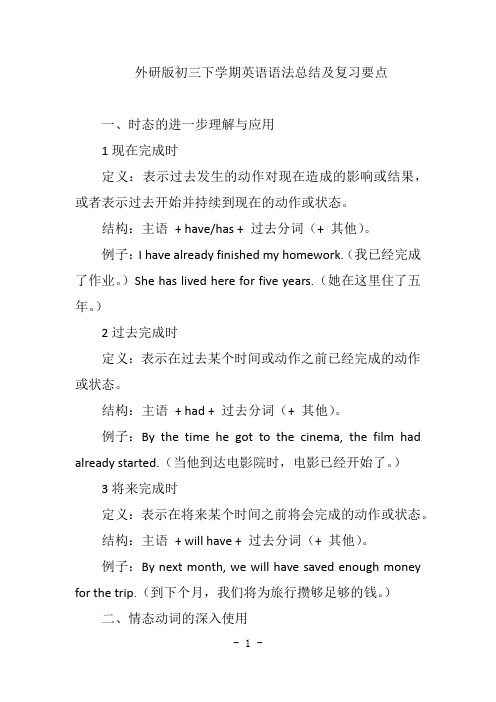
外研版初三下学期英语语法总结及复习要点一、时态的进一步理解与应用1现在完成时定义:表示过去发生的动作对现在造成的影响或结果,或者表示过去开始并持续到现在的动作或状态。
结构:主语+ have/has + 过去分词(+ 其他)。
例子:I have already finished my homework.(我已经完成了作业。
)She has lived here for five years.(她在这里住了五年。
)2过去完成时定义:表示在过去某个时间或动作之前已经完成的动作或状态。
结构:主语+ had + 过去分词(+ 其他)。
例子:By the time he got to the cinema, the film had already started.(当他到达电影院时,电影已经开始了。
)3将来完成时定义:表示在将来某个时间之前将会完成的动作或状态。
结构:主语+ will have + 过去分词(+ 其他)。
例子:By next month, we will have saved enough money for the trip.(到下个月,我们将为旅行攒够足够的钱。
)二、情态动词的深入使用1情态动词的基本用法情态动词用于表示能力、可能性、义务或推测等。
例子:I can swim.(我会游泳。
)He might be late.(他可能会迟到。
)You should help your mother with the housework.(你应该帮妈妈做家务。
)2情态动词与完成时态的结合情态动词可以与完成时态结合,表示对过去情况的推测或假设。
例子:She must have forgotten about the meeting.(她一定忘记了会议。
)I could have passed the exam if I had studied harder.(如果我更努力学习,我本可以通过考试。
外研版-九年级上册英语语法知识点总结大全

外研版-九年级上册英语语法知识点总结大全1. 时态 (Tenses)- 现在时 (Present Simple)- 过去时 (Past Simple)- 将来时 (Future Simple)- 现在进行时 (Present Continuous)- 过去进行时 (Past Continuous)- 将来进行时 (Future Continuous)- 现在完成时 (Present Perfect)- 过去完成时 (Past Perfect)- 将来完成时 (Future Perfect)- 现在完成进行时 (Present Perfect Continuous)- 过去完成进行时 (Past Perfect Continuous)- 将来完成进行时 (Future Perfect Continuous)2. 名词 (Nouns)- 可数名词 (Countable Nouns)- 不可数名词 (Uncountable Nouns)- 可数名词的单数和复数形式 (Singular and Plural forms of Countable Nouns)- 不可数名词的量词 (Quantifiers for Uncountable Nouns)3. 代词 (Pronouns)- 主格代词 (Subject Pronouns)- 宾格代词 (Object Pronouns)- 物主代词 (Possessive Pronouns)- 反身代词 (Reflexive Pronouns)- 相互代词 (Reciprocal Pronouns)- 疑问代词 (Interrogative Pronouns)- 关系代词 (Relative Pronouns)- 不定代词 (Indefinite Pronouns)- 指示代词 (Demonstrative Pronouns)4. 形容词 (Adjectives)- 基本形容词 (Basic Adjectives)- 最高级 (Superlative Adjectives)- 成比例形容词 (Proportional Adjectives)- 不成比例形容词 (Non-proportional Adjectives)- 数量形容词 (Quantity Adjectives)5. 副词 (Adverbs)- 程度副词 (Adverbs of Degree)- 方式副词 (Adverbs of Manner)- 频率副词 (Adverbs of Frequency)- 时间副词 (Adverbs of Time)- 地点副词 (Adverbs of Place)6. 介词 (Prepositions)- 表示位置的介词 (Prepositions of Location) - 表示时间的介词 (Prepositions of Time)7. 连词 (Conjunctions)- 并列连词 (Coordinating Conjunctions)- 从属连词 (Subordinating Conjunctions)- 关联词 (Correlative Conjunctions)8. 冠词 (Articles)- 定冠词 (Definite Articles)- 不定冠词 (Indefinite Articles)- 0 冠词 (Zero Article)9. 动词 (Verbs)- 不及物动词 (Intransitive Verbs)- 及物动词 (Transitive Verbs)- 及物动词和间接宾语 (Transitive Verbs with Indirect Objects) - 及物动词和直接宾语 (Transitive Verbs with Direct Objects) - 及物动词和宾语从句 (Transitive Verbs with Object Clauses) - 助动词 (Auxiliary Verbs)- 基本行为动词 (Basic Action Verbs)- 系动词 (Linking Verbs)- 情态动词 (Modal Verbs)- 动词的时态和语态 (Tenses and Voices of Verbs)10. 从句 (Clauses)- 名词性从句 (Noun Clauses)- 定语从句 (Adjective Clauses)- 状语从句 (Adverbial Clauses)11. 被动语态 (Passive Voice)以上是九年级上册英语语法知识点总结大全。
外研版初三英语语法知识总结
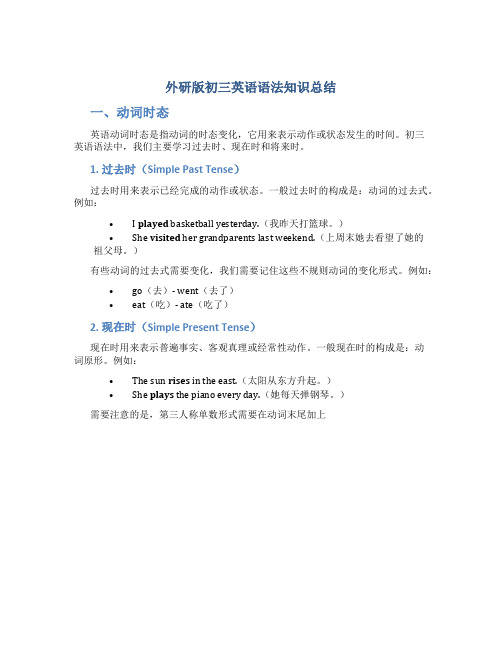
外研版初三英语语法知识总结
一、动词时态
英语动词时态是指动词的时态变化,它用来表示动作或状态发生的时间。
初三
英语语法中,我们主要学习过去时、现在时和将来时。
1. 过去时(Simple Past Tense)
过去时用来表示已经完成的动作或状态。
一般过去时的构成是:动词的过去式。
例如:
•I played basketball yesterday.(我昨天打篮球。
)
•She visited her grandparents last weekend.(上周末她去看望了她的祖父母。
)
有些动词的过去式需要变化,我们需要记住这些不规则动词的变化形式。
例如:
•go(去)- went(去了)
•eat(吃)- ate(吃了)
2. 现在时(Simple Present Tense)
现在时用来表示普遍事实、客观真理或经常性动作。
一般现在时的构成是:动
词原形。
例如:
•The sun rises in the east.(太阳从东方升起。
)
•She plays the piano every day.(她每天弹钢琴。
)
需要注意的是,第三人称单数形式需要在动词末尾加上。
外研版初中英语语法总结

外研版初中英语语法总结外研版初中英语语法总结一、句子成分一个句子由各个功能部分组成,这些功能部分被称为句子成分。
常见的句子成分包括主语、谓语、宾语、状语、定语等。
1、主语:表示句子所描述的主体,通常位于谓语之前。
例如:I love English.(我爱英语。
)2、谓语:表示主语的动作或状态,通常由一个动词构成。
例如:He runs every day.(他每天跑步。
)3、宾语:表示谓语动作的对象,通常位于谓语之后。
例如:They watch TV every night.(他们每天晚上看电视。
)4、状语:表示时间、地点、方式、原因等副词或短语,通常位于句末。
例如:They played football on the playground.(他们在操场上踢足球。
)5、定语:表示名词或代词的性质或特征,通常用形容词或短语来充当。
例如:She is a beautiful girl.(她是一个漂亮的女孩。
)二、时态时态是用来表示动作或状态发生的时间和方式的语法形式。
以下是初中阶段常见的几种时态:1、现在时:表示当前时间正在发生的动作或状态。
例如:I am studying.(我正在学习。
)2、过去时:表示过去某个时间已经发生的动作或状态。
例如:She studied English last year.(她去年学了英语。
)3、将来时:表示将来某个时间将会发生的动作或状态。
例如:They will visit Beijing next week.(他们下周将访问北京。
)三、语态语态表示动词和主语的关系,分为被动语态和主动语态。
1、被动语态:表示主语是动作的承受者,用助动词be和动词的过去分词构成。
例如:The book was written by him.(这本书是由他写的。
)2、主动语态:表示主语是动作的执行者,通常由主语和动词的原形或第三人称单数形式构成。
例如:He writes a letter every day.(他每天写一封信。
初中外研英语语法知识点总结
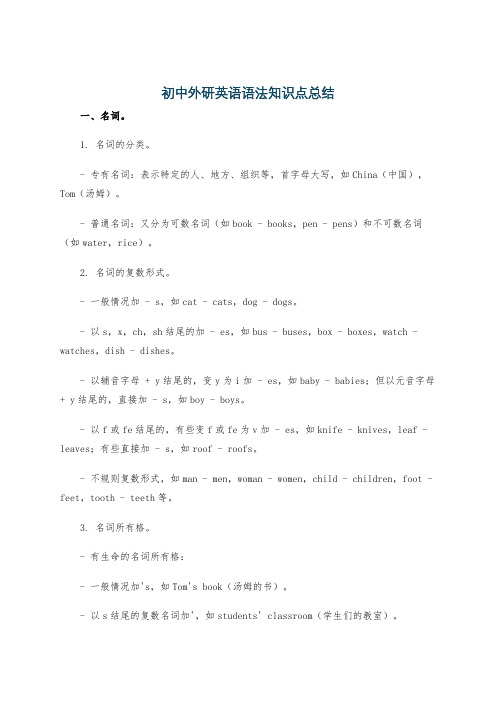
初中外研英语语法知识点总结一、名词。
1. 名词的分类。
- 专有名词:表示特定的人、地方、组织等,首字母大写,如China(中国),Tom(汤姆)。
- 普通名词:又分为可数名词(如book - books,pen - pens)和不可数名词(如water,rice)。
2. 名词的复数形式。
- 一般情况加 - s,如cat - cats,dog - dogs。
- 以s,x,ch,sh结尾的加 - es,如bus - buses,box - boxes,watch - watches,dish - dishes。
- 以辅音字母 + y结尾的,变y为i加 - es,如baby - babies;但以元音字母+ y结尾的,直接加 - s,如boy - boys。
- 以f或fe结尾的,有些变f或fe为v加 - es,如knife - knives,leaf - leaves;有些直接加 - s,如roof - roofs。
- 不规则复数形式,如man - men,woman - women,child - children,foot - feet,tooth - teeth等。
3. 名词所有格。
- 有生命的名词所有格:- 一般情况加's,如Tom's book(汤姆的书)。
- 以s结尾的复数名词加',如students' classroom(学生们的教室)。
- 表示两者或多者共有时,最后一个名词加's,如Tom and Jerry's room(汤姆和杰瑞的房间);表示各自所有时,每个名词都加's,如Tom's and Jerry's toys (汤姆的和杰瑞的玩具)。
- 无生命的名词所有格用“of + 名词”结构,如the window of the room(房间的窗户)。
二、冠词。
1. 不定冠词a/an。
- a用于以辅音音素开头的单词前,如a book;an用于以元音音素开头的单词前,如an apple。
最新最全外研版九年级语法总结

九年级英语重点知识梳理Unit11. by + doing 通过……方式如:by studying with a groupby 还可以表示:“在…旁”、“靠近”、“在…期间”、“用、”“经过”、“乘车”等如:I live by the river. I have to go back by ten o’clock.The thief entered the room by the window.The student went to park by bus.2. talk about 谈论,议论,讨论如:The students often talk about movie after class. 学生们常常在课后讨论电影。
talk to sb. === talk with sb. 与某人说话3. 提建议的句子:①What/ how about +doing sth.?如:What/ How about going shopping?②Why don’t you + do sth.? 如:Why don’t you go shopping?③Why not + do sth. ? 如:Why not go shopping?④Let’s + do sth. 如:Let’s go shopping⑤Shall we/ I + do sth.? 如:Shall we/ I go shopping?4. a lot 许多常用于句末如:I eata lot. 我吃了许多。
5. too…to 太…而不能常用的句型too+adj./adv. + to do sth.如:I’m too tired to say anything. 我太累了,什么都不想说。
6. aloud, loud与loudly的用法三个词都与"大声"或"响亮"有关。
①aloud是副词,重点在出声能让人听见,但声音不一定很大,常用在读书或说话上。
- 1、下载文档前请自行甄别文档内容的完整性,平台不提供额外的编辑、内容补充、找答案等附加服务。
- 2、"仅部分预览"的文档,不可在线预览部分如存在完整性等问题,可反馈申请退款(可完整预览的文档不适用该条件!)。
- 3、如文档侵犯您的权益,请联系客服反馈,我们会尽快为您处理(人工客服工作时间:9:00-18:30)。
外研社初三英语语法总复习名词一、名词的分类:根据用法,名词可以分为可数名词和不可数名词两类。
1. 可数名词有单、复数形式的区别。
需要掌握规则名词的复数形式的构成。
*以y纟吉尾的专有名词,或元音字母+结尾的名词变复数时,直接加s变复数:女口:two Marysthe Henrys mon key---mon keysholiday---holidays 比较:层楼:storey ---storeys story---stories* 以o 结尾的名词,变复数时:a.力口s,女口:photo---photospiano---pianos radio---radioszoo---zoos ;b. 力口es,如:potato--potatoestomato--tomatoes hero--heroes Negro--Negroes* 以f 或fe 结尾的名词变复数时常去 f , fe加ves,如: half---halvesknife---knivesleaf---leaveswife---wiveslife---lives thief---thieves2•名词复数的不规则变化1)child---children foot---feettooth---teeth mouse---miceman---men woman---women 注意:与man禾口woman 构成的合成词,其复数形式也是-men禾口-women。
如:an Englishman,twoEn glishme n.但German不是合成词,它是由Germa ny去y变化而来,故复数形式为Germa ns; Bowman 是姓,其复数是the Bowmans。
2)单复数同形如: deer,sheep, fish,Chinese,Japanese,jin,yuan,two li,three mu,four jin 但除人民币元、角、分外,美元、英镑、法郎等都有复数形式。
如:a dollar, two dollars;a meter, two meters3)以s结尾,仍为单数的名词,如:a. maths,politics,physics等学科名词,为不可数名词,是单数。
b. news是不可数名词。
c. the Uni ted States,the Uni ted Natio ns 应视为单数。
The Uni ted Natio ns was orga nized in 1945.d. 以复数形式出现的书名,剧名,报纸,杂志名,也可视为单数。
"The Arabian Nights" is a very interesting story-book. << 一千零一夜>>故事书。
4)表示由两部分构成的东西,如:glasses眼镜)trousers,clothes若表达具体数目,要借助数量词pair(对,双);suit(套);a pair of glasses; two pairs of trousers6. )常以复数形式出现并使用的名词:clothes, people, trousers, glasses, scissors, thanks,con gratulati ons, wishes, police, stairs(楼梯),works(著作),woods(森林),times(时代)3. 不可数名词量的表示:可以借助单位词表一定的数量。
如: a glass of water \ a piece of cake4. 修饰可数名词的词有:ma ny, few, a few, a nu mber of,数词修饰不可数名词的词有:much, little, a little, a great deal of即可修饰可数名词也可修饰不可数名词的词有:some (an y), no, a lot of, ple nty of二、定语名词的复数(即名词修饰名词):名词作定语一般用单数,但也有以下例外。
1)用复数作定语。
如:sports meeting运动会students reading-room学生阅览室2)ma n, woma n,等作定语时,其单复数以所修饰的名词的单复数而定。
如:men workers3)数词+名词作定语时,这个名词一般保留单数形式。
如:two-dozen eggs两打/ (二十四个鸡蛋)a ten-mile walk 十里路two-hundred trees a five-year plan. —个五年计戈V some banana treestwo book stores三、名词的格1.有生命的人、物的所有格在词尾加“’,如the boy ' s bag2•若名词词尾已有-s,只^口’,女口:Teachers'Day the twins 'parents, the students'books3. 时间、距离、地域等名词的所有格形式为-'s : today's newspapermen minutes' walk \the city's problem 4•在表示店铺或教堂的名字或某人的家时,名词所有格的后面常常不出现它所修饰的名词女口:the barber's a t my aunt's (house) go to the doctor's .5. 凡不能加"'s"的名词,都可以用"名词+of +名词"的结构来表示所有关系如:the title of the song歌的名字the window of the house。
6.如果两个名词并列,并且分别有's, 则表示”分别有”;只有一个’s,则表示’共有'。
女口:John's and Mary's rooms(两间)John and Mary's room (一间)7.双重所有格形式:a novel of Mark Twin 's a friend of my father's / mine代词1 •人称代词1. )人称代词的主格在句子中作主语,例如:Joh n waited a while but eve ntually he went home. 约翰等了一会儿,最后他回家了。
说明:在复合句中,如果主句和从句主语相同,代词主语要用在从句中,名词主语用在主句中,例如:Whenhe arrived, Joh n went straight to the bank.2)人称代词的宾格在句子中作动词的宾语或介词宾语,第一人称在省略句中,还可以作主语。
例如:I saw her with them。
her 做宾语,them 做介词宾语,a. -- Who broke the vase?-谁打碎了花瓶?b. -- Me.--我。
(me = It's me.)在正式文体中这里应为I。
宾格代替主格的情况:a. 在简短对话中,当人称代词单独使用或在not后,多用宾语。
----I like English.--我喜欢英语。
----Me too.--我也喜欢。
---- Have more wine?--再来点酒喝吗? ---Not me.--我可不要了。
b. 在表示比较的非正式的文体中,常用宾格代替主格。
但如果比较状语的谓语保留,贝件语只能用主格。
He is taller than I/me. He is taller than I am.3)动物名词的指代一般用it或they代替,有时也用he, she,带有亲切的感情色彩。
Give the cat some food. She is hun gry.给这猫一些吃的。
她饿了。
多个人称的排序问题1)单数人称代词并列作主语时,其顺序为:you, he / she and I女口:You, he and I should return on time.2)复数人称代词作主语时,其顺序为:we, you and they*注意:在承认错误,承担责任时,第一人称放在前面It was I and John that made her angry.*it的主要用法:可以表示天气,时间,距离,形式主语,形式宾语,身份等.2. 物主代词(…人的):包括形容词性的物主代词和名词性的物主代词用法:形容词性的物主代词+名词;名词性的物主代词=形容词性的物主代词+名词3•反身代词:(1)加强语气,起强调作用,“…自己”亲自”本人”(2)用在一些动词后,表示主语既是动作的发出者,也是动作的承受者.常见的这类动词有:teach, dress, help, look after, enjoy, hurt, wash4. 不定代词(1)none (of)指人或物回答how many / much 的问题no body, no one 指人no thi ng 指物⑵one指人或物,复数为ones, that指物(不可数名词),iL指代前面提到的物体I have got a nice watch. Would you like to buy one? ( a watch)I have got a nice watch. Do you like it? ( the watch)The weather here is better than that in Beiji ng. (the weather)(3)三者或三者以上:all (全部,者E )any (任何一个) none (—个也没有)两者:both (全部,者8 ) either (任意一个)neither (—个也没有)* Neither of us is from the USA.None of us have / has ever bee n there before.*not与both, all连用表示部分否定.(4)s ome用于肯定句中,也可用于表示请求、建议或希望得到肯定答复的疑问句中any用于疑问句、否定句中;还有“任何的”意思(5)ano ther泛指另一个the other常与one连用,表示两者中的另一个one…the other…others泛指别的,其他的the others特指别的,其他的(有范围限制)(the) others = (the) other + 名词else放在合成不定代词或疑问词之后⑹every +名词,只能做定语,(三者或三者以上)each两者或两者以上的“每一”,可以单独使用常见的短语:each of each other(7)合成不定代词的用法(略)*形容词后置数词表示数目多少或顺序多少的词叫数词,数词分为基数词和序数词。
